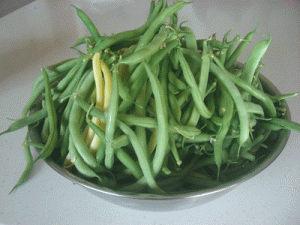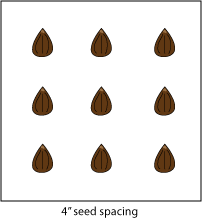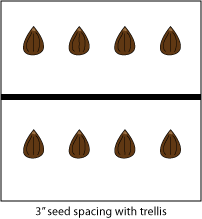Beans
Beans (bush and pole) are a tender vegetable that grow best in warm weather.
Spring Planting
Beans do not transplant well. Plant bean seeds directly in the garden during the week of the last frost.
Pole beans should be planted all at once with 8 per square. They take slightly longer to mature, but then continue producing beans throughout the summer.
Bush beans are planted 9 per square. After maturing they will produce beans for 2-3 weeks, and then they can be pulled up. Extend the harvest of bush beans by planting one or two squares every 2 weeks.
Fall Planting
Pole beans will continue to produce until freezes in the fall kill the plant. Bush beans can be planted throughout the summer and be harvested during the fall until frost kills them.
Soil and Fertilizer
Beans grow best in a rich soil that drains well; amend with lots of compost and fertilizer (chemical or organic) at planting.
Fertilizer: Apply 16-16-8 at planting. If desired, apply a fertilizer low in nitrogen once or twice during the season. I like to use this Fertilome Blooming and Rooting (9-59-8), it really seems to promote flowering and fruiting of the plant.
Support
Pole beans will do best with a trellis. Bush beans do not require support, though if they are taking up too much space you can use string to loosely tie them together.
Harvest
Harvest bush and pole beans when they are small and tender, before the seeds start to mature and swell. Picking beans encourages production, so be sure to harvest regularly.
More Resources
- Beans Reference Sheet (Utah Extension Service)
- Another Beans Reference Sheet (Utah Extension Service)







Hi Emily!
First off, I love your website! I am new to square foot gardening and am LOVING my new garden boxes and am having great success. I have a self reliance blog and website, and readers all over the U.S. who I think would benefit greatly from your site. This next month we are going to be focusing on gardening and I would love to introduce our readers to your site. We are looking to do giveaways having to do with gardening and I think your ebook would be perfect! I also have a few other ideas in mind of how we can work together if you would like to contact me. I can’t wait to hear back from you.
Thanks so much!
Shandra
A groundhog came lat week and tore down our peas and beans. Broke the stems and ate every leaf they had. Destroyed our whole bean and pea crop. I cried, it was awful. Can you recommend a preventative measure we can take next year?
Nitrogen won’t kill your beans, they are just “nitrogen fixing” so they actually put nitrogen back into the soil. So you may end up with high amounts of nitrogen in that area.
Also, it might encourage a lot of leafy growth, and delay flowering and fruiting. Be sure to add a fertilizer high in the MIDDLE number to compensate.
I have a question about fertilizer/deer repellant. I found a product called plantskyyd that is made from bovine blood, so is basically nitrogen. The makers claim it’s good as a fertilizer, but all your advice seems to be to use fertilizers LOW in nitrogen. Do you think this product will kill my plants? I’m torn, bc the deer here will eat the whole garden if given the chance, and fencing is not an option. What do you suggest?